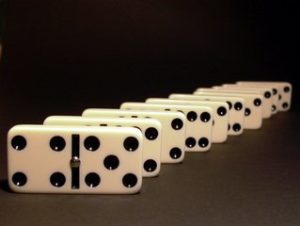
Among scientists it is the name used to describe systematic concepts that were designed to explain why and how individuals and organizations strategize, i.e. make decisions when one person (or more than one other person) might also affect the outcome of the decision. This concept is so important that researchers in the field have won dozens of Nobel Prizes including the two awarded this year
Today, (2020) game theory has become an umbrella term or ‘unified field’ theory for thousands of games, most being rational approaches to many different defined interactions including relationships in business, spirituality, competition, sports, romance, and even interactions with nonhuman players such as computers, animals, and plants.
Another way of describing game theory is as the observation of a set of ideas and numbers that describe the past, present, or future state of something particularly strategic interactions between two or more individuals or groups (players) in a situation containing set rules and outcomes. Gamer theory used in a number of disciplines and can be applied to make individual choices in everday life. The theory has most notably used as a tool within the study of economics, particularly in politics, sports, and international affairs. The economic application of game theory can be a valuable tool to aid in the fundamental analysis of industries, sectors, and any strategic interaction between two or more firms or individuals who need to strategize to create maximum benefit at the lowest possible cost.
How is game theory connected to happiness? Happiness can mean different things to different people. What game theory, especially my approach, known as Harrison’s Applied Game Theory (HAGT) can do is, reduce the ways in which people suffer.
Suffering is disruptive and at times necessary mental, emotional, psychological, and also a spiritual experience of unpleasantness and aversion associated with harm or threat of harm. On the positive side, suffering can contribute to how you organize meaning in your emotional world and much more. One should never assume that all suffering is negative. The key is to understand which suffering is essential and which is a self-created illusion.

For the unaware individual, it is often a negative experience, especially if this individual has made poor choices in the past.
Compassion, one of the most worthy, and admired of human qualities; often comes from recognizing the suffering of others. Their suffering may present great meaning and direction to your own life, motivating, and also inspiring you to serve others in need. This service, in turn, creates a larger sense of community.
What determines how intense your suffering is or will be? The origin and cause of suffering; its processes, the meaning it presents to the individual who seems to be suffering; its related social, personal, and cultural behaviors; the knowledge of how to manage, reduce, or eliminate the suffering; and the benefits one might accrue for having suffered will all influence the intensity of that suffering.
Add to this the frequency of each occurrence, plus the concurrence of mental, emotional, psychological, and also spiritual factors involved. Now by combining these with the duration of the suffering, and you have a wide range of experiences related to suffering. If you are to understand the meaning of your life it is essential that you explore how and why you suffer.
The Meaning of Life
All human suffering, whether necessary or self-created, is tied to obstacles that have meaning for us. Such an obstacle
may be associated with some physical or psychological discomfort, or spiritually speaking, from the “pain of longing” – the seeking of something deeper than the world of form. Who can say what it might be?

Transcending obstacles define much of what goes on in life. Think about it. It is likely that you function day to day on “automatic pilot,” then suddenly you experience a usually unexpected obstacle. Now, this obstacle might be walking up the steps of a non-functioning escalator, or waiting in a long line at the post office. It may be something equally annoying like a sudden red light that causes you to hit the brakes on your car. These types of challenges are what get your attention.
When things, events, or people limit your freedom, these “obstacles” take on meaning. We are also often drawn to things of great beauty, sensuality, and elegance. These things also have meaning. So as you can see, to notice something, positive or negative is to give it meaning.
What does it mean for something to have meaning? This is an important question. Many great thinkers have proposed that all meaning is based on your perception as well as shifts in your perception.
Many of us go through life unconsciously. We each decide arbitrarily that some things are important while others are not. Something might have meaning now that did not have any meaning just a few moments ago.
Does ‘meaning’ have to have a particular quality or quantity to it? Will any sense of meaning do? How would you even know if something had more than a superficial meaning? What’s the link between meaning and significance in daily action? If something has meaning for you, does it have ‘meaning’ because it reinforces your sense of being – or is something deeper going on? Is meaning anything more than what grabs your attention?

Your answers to these questions about the “meaning of life” may have great implications for how you think, make choices, use language, and communicate with others in the process of daily living. Without this inquiry, you may be destined to a life of confusion or intellectual, emotional, and spiritual numbness.
What Harrison’s Applied Game Theory does is offer a person the ability to be more effective, efficient, precise, productive, and self-aware. It also gives creative and innovative thinkers the opportunity to create greater meaning in their life by making a measurable difference in the world.
Learn more at: https://lewiscoaches.medium.com
To Explore Game Applied Theory Strategies
· My Youtube — for more kick @ videos to take your life and business to the next level… asklewis/lewis harrison game theory #1 (https://www.youtube.com/watch?v=4lzIPU0DSiU&t=87s)
·Listen To My Funny, and Entertaining Personal Development Podcast — to get just ONE idea a day that will add additional knowledge, wisdom, as well as zeros to your profit line. What is Personal Development — AskLewis Self Improvement Tips #1
· Join My Invitation Only FB Group — to get tons of free lessons based on Applied game Therapy Group on FB https://www.facebook.com/search/top/?q=lewis%20harrison%27s%20applied%20game%20theory
· Twitter — @Asklewis
· Msg Me — on Facebook messenger and let me know what you’re struggling with the most! (I’ll actually reply!)
To view many other articles on game theory click below:
https://lewiscoaches.medium.com
000000000
The Course on Applied Game Theory
Click below
 A-Z and Beyond…
A-Z and Beyond…
oooooooooooooooooooooooooooooooooooooooooooooooooooooo
Join our mailing list
http://Asklewis.com
ooooooooooooooooooooooooooooooooooo
Sign up for our free daily newsletter. Click on the newsletter tab below. This will bring you to our master website at RealUGuru.com – Just look over to the right of the page and fill in your email address and join “The Lew Crew.” You get our regular, informative, motivational, inspirational, and factual, blogs, vlogs, newsletters. and discount coupons.
ooooooooooooooooooooooooooooooooooo
Contact Information
Thanks for allowing me to share my knowledge with you. If you want to contact me, simply drop me an email…
LewisCoaches@ gmail.com
oooooooooooooooooooooooooooooooooooooooooooooooooooooo

This is my first time visit at here and i am really happy to read everthing at single place. Tierney Swen Corsetti